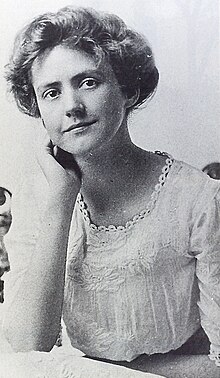Susan Glaspell | |
|---|---|
 Glaspell in 1894 | |
| Born | Susan Keating Glaspell July 1, 1876 Davenport, Iowa, US |
| Died | 28 July 1948 (aged 72) Provincetown, Massachusetts, US |
| Education | Drake University (BA) |
| Notable works | Alison's House Trifles ("A Jury of Her Peers") |
| Notable awards | Pulitzer Prize for Drama (1931) |
| Spouse | George Cram Cook (1913–24†) companion, Norman Matson (1924–32) |
| Signature | |
Susan Keating Glaspell (July 1, 1876 – July 28, 1948) was an American playwright, novelist, journalist and actress. With her husband George Cram Cook, she founded the Provincetown Players,[1] the first modern American theatre company.[2]
First known for her short stories (fifty were published), Glaspell also wrote nine novels, fifteen plays, and a biography.[3] Often set in her native Midwest, these semi-autobiographical tales typically explore contemporary social issues, such as gender, ethics, and dissent, while featuring deep, sympathetic characters who make principled stands. Her 1930 play Alison's House earned her the Pulitzer Prize for Drama.[4]
After her husband's death in Greece, she returned to the United States. During the Great Depression, Glaspell worked in Chicago for the Works Progress Administration, where she was Midwest Bureau Director of the Federal Theater Project. Although a best-selling author in her own time, after her death Glaspell attracted less interest and her books went out of print. She was also noted for discovering playwright Eugene O'Neill.
Since the late 20th century, critical reassessment of women's contributions has led to renewed interest in her career and a revival of her reputation.[5] In the early 21st century, Glaspell is today recognized as a pioneering feminist writer and America's first important modern female playwright.[6] Her one-act play Trifles (1916) is frequently cited as one of the greatest works of American theatre.[7] According to Britain's leading theatre critic, Michael Billington, she remains "American drama's best-kept secret."[8]
- ^ Ben-Zvi, Linda. "Preface." Preface. Susan Glaspell: Her Life and Times. Oxford University Press, 2005. Ix.
- ^ Sarlós, Robert K. (1984). "The Provincetown Players' Genesis or Non-Commercial Theatre on Commercial Streets", Journal of American Culture, Vol. 7, Issue 3 (Fall 1984), pp. 65–70
- ^ Ben-Zvi, Linda. "Preface." Preface. Susan Glaspell: Her Life and Times, Oxford University Press, 2005. X.
- ^ "Alison's House". IBDB.com. Internet Broadway Database.
- ^ Smith, Dinitia. "Rediscovering a Playwright Lost to Time.", New York Times, June 30, 2005. Theater page. Print.
- ^ Ben-Zvi, Linda (2005). Susan Glaspell: Her Life and Times. Oxford University Press, second cover
- ^ Carpentier, Martha C. (2008). "Susan Glaspell: New Directions in Critical Inquiry." Cambridge Scholars Publishing, pp. 3
- ^ Billington, Michael. "Alison's House", The Guardian, Sunday 11 October 2009. Theatre page.